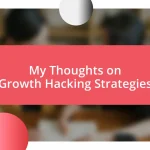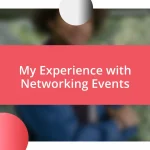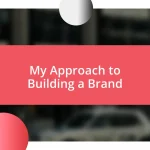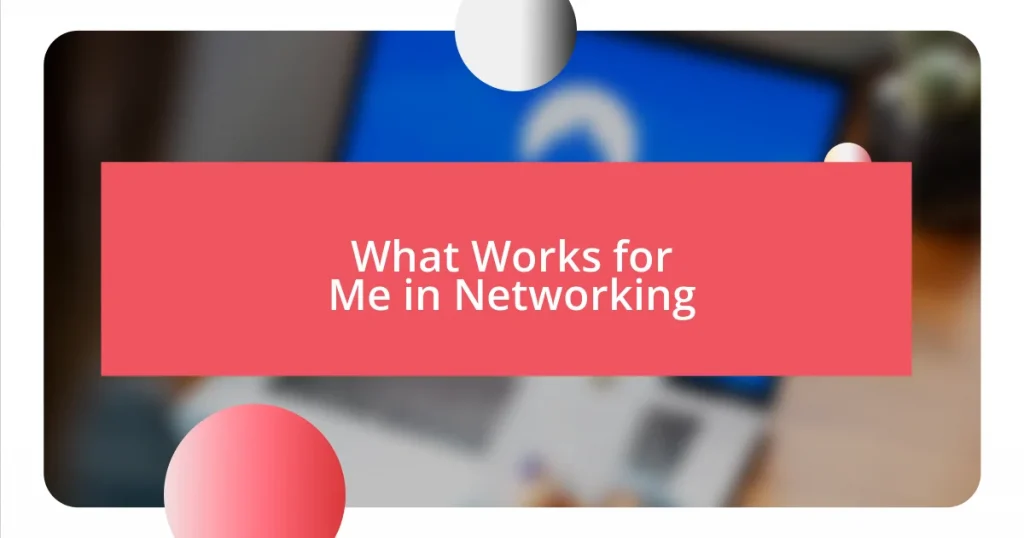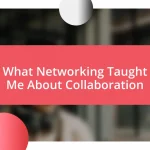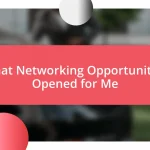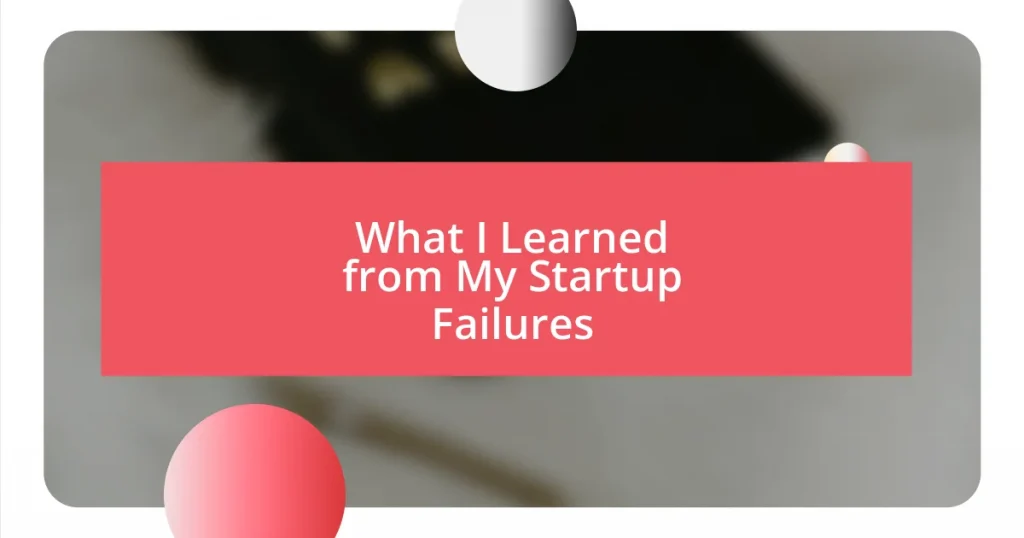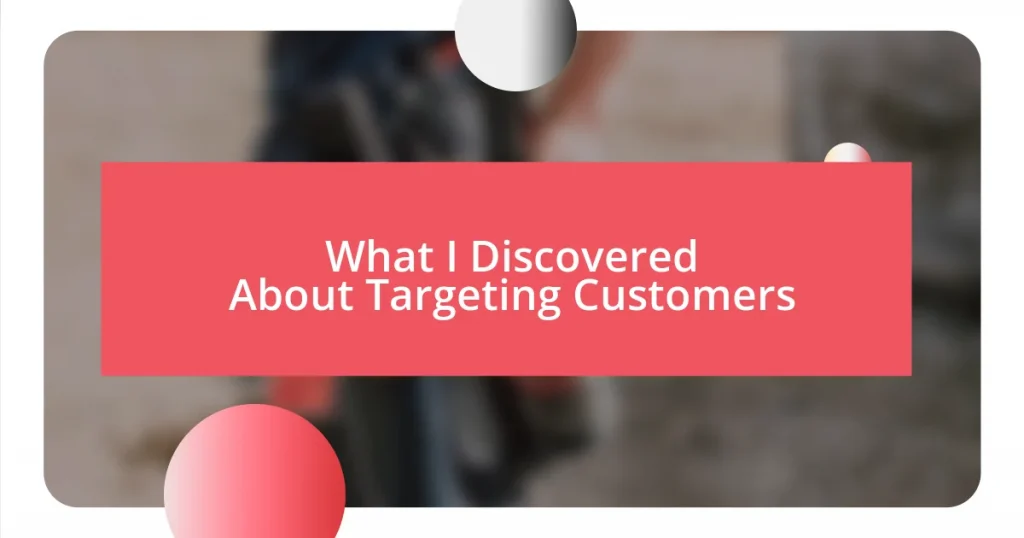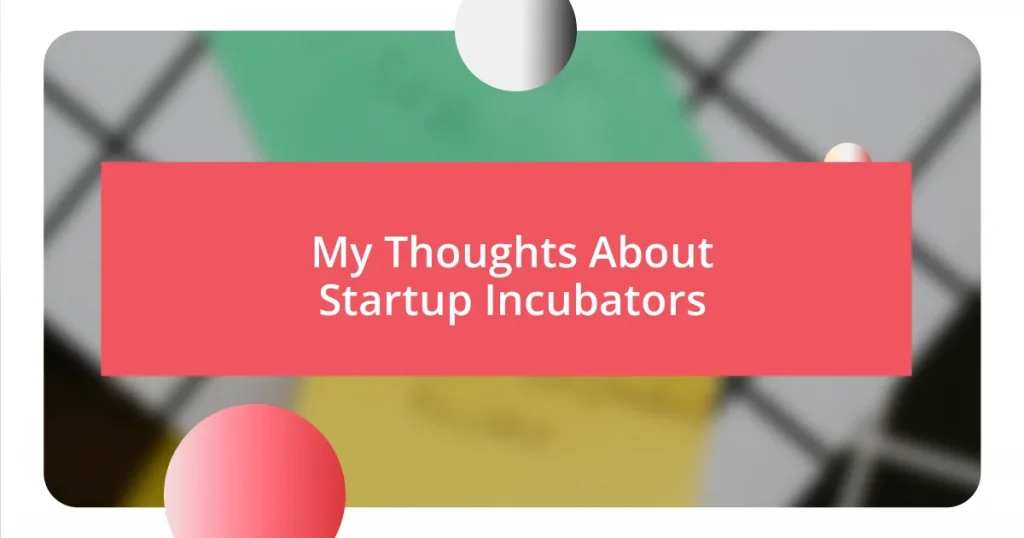Key takeaways:
- Networking is about building genuine relationships through connection and contribution, fostering mutual support over transactional exchanges.
- Personalization and timely follow-ups are crucial for maintaining connections and turning initial interactions into meaningful relationships.
- Mastering effective elevator pitches and preparing for networking events can create opportunities for collaboration and lasting professional connections.
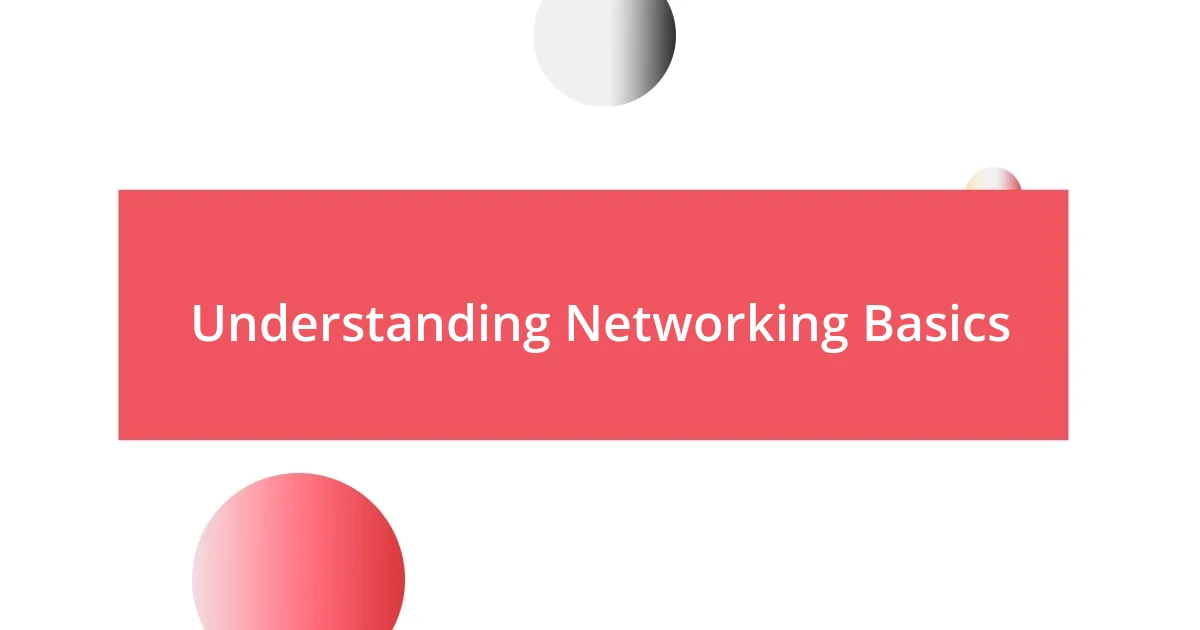
Understanding Networking Basics
Networking goes beyond just exchanging business cards; it’s about building genuine relationships. I remember my first networking event—the nerves were palpable. But once I started engaging, I realized that people appreciate authenticity. Doesn’t it feel great when someone genuinely listens to what you have to say?
Understanding the basics of networking involves recognizing its two key components: connection and contribution. In my experience, it’s essential to approach networking with a mindset of giving rather than just receiving. Have you ever attended a gathering where everyone seemed more interested in talking about themselves? I find that when I offer help or share my insights, others are more inclined to reciprocate.
Moreover, effective networking hinges on understanding shared interests. I often make notes about what others are passionate about; it helps me create meaningful conversations later. When I found someone else who loved hiking as much as I did, it sparked a connection that has lasted years. Isn’t it amazing how common interests can bridge gaps and foster lasting relationships?
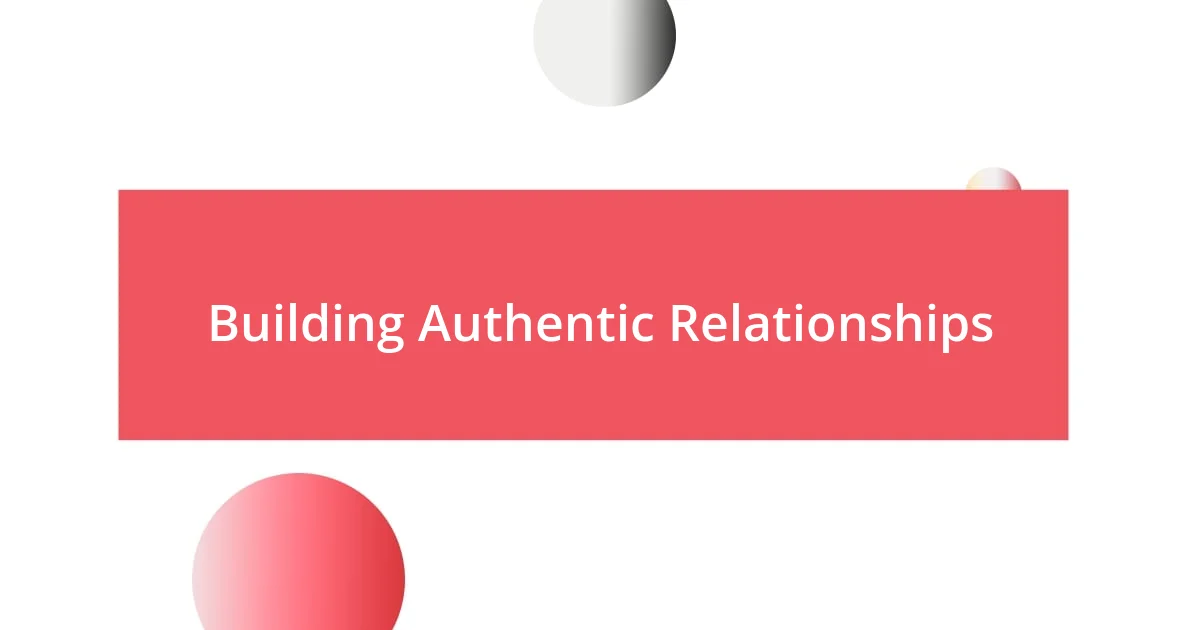
Building Authentic Relationships
Building authentic relationships in networking has often felt like discovering hidden treasures over time. I remember a particularly enlightening moment when I reached out to a colleague for advice about a project. To my surprise, that simple conversation blossomed into a mentorship that transformed not only my career but also my understanding of professional relationships. It was a true reminder that genuine engagement can lead to far deeper connections than transactional exchanges.
Reflecting on my experiences, I’ve found that being vulnerable goes a long way. Once, during a networking workshop, I shared a failure I faced in my career. The room shifted; suddenly, people began to open up about their struggles too. It was a powerful moment of connection. Vulnerability creates a safe space, encouraging others to share their own stories. That’s when you realize that behind every professional façade, there’s a person who’s navigating similar challenges.
Moreover, the importance of follow-up cannot be overstated. After attending an event, I make it a point to send personalized messages to the individuals I connected with. In one instance, I remembered a participant’s passion for sustainable practices. Following up with an article I found on the topic not only kept the conversation going, but also reinforced our bond. What I’ve learned is that great networking happens in the quiet moments after the event, where you take the time to show you care.
| Authenticity | Transactional Networking |
|---|---|
| Creates deeper connections | Short-term exchanges |
| Encourages vulnerability | Focuses on self-promotion |
| Fosters mutual support | Lacks genuine interest |

Mastering Elevator Pitches
Mastering elevator pitches has been a game-changer for me in networking. Crafting a concise, compelling pitch that feels authentic can set the stage for meaningful conversations. I remember the first time I tried to pack my professional essence into just 30 seconds. It felt overwhelming, but with practice, I learned to focus on what really matters—sharing my passion and creating curiosity about my work, rather than just listing my credentials.
Here are some key elements to consider when developing your pitch:
- Know Your Audience: Tailor the pitch to resonate with who you’re speaking to. Understanding their interests can guide your messaging.
- Highlight a Unique Value: What sets you apart? Emphasizing this can captivate your listener’s attention.
- Keep It Conversational: Don’t sound robotic; allow for natural dialogue. I often weave in a light-hearted story or personal anecdote to humanize my pitch.
- Practice, Practice, Practice: Familiarity breeds confidence. I practice my pitch in front of friends who can give candid feedback—it’s invaluable!
As I continued refining my elevator pitch, I realized it’s more than just a rehearsed statement. It’s about connecting with others genuinely. Once, after practicing in front of a mirror, I delivered my pitch at an event, sparking a conversation that led to a thrilling collaboration. That’s the magic of mastering your pitch; it’s about opening doors for deeper connections and exciting possibilities.

Expanding Your Network Online
Expanding your network online has been one of my most rewarding experiences in recent years. I vividly recall joining an industry-specific LinkedIn group where professionals gathered to share insights and advice. At first, I hesitated to comment, feeling like an outsider. But one day, I took the plunge and shared my thoughts on a recent trend. Much to my surprise, it sparked an ongoing discussion that led to connections with several experts who later became valuable contacts in my network. Isn’t it amazing how a few typed words can lead to real connections?
Social media platforms offer an incredible opportunity to engage with like-minded professionals. I learned this firsthand after posting an article I wrote, which caught the attention of a few influential figures in my field. Their supportive comments encouraged me, and before I knew it, we were collaborating on a project together. I often wonder how many opportunities we miss by simply scrolling instead of engaging. Taking that extra step to interact can open doors we never knew existed.
Building relationships online requires intentionality, and I’ve found that regular participation in discussions can be incredibly beneficial. For instance, I set aside time each week to comment on posts and share insights relevant to my expertise. During one such session, a connection reached out to ask for my opinion on a challenge they were facing. Our conversation flourished into not only a professional relationship but also a friendship that has enriched my career. Isn’t it fascinating how a simple act of engagement can turn a virtual acquaintance into a trusted ally?

Following Up Effectively
Following up effectively is where the real magic in networking happens. I remember one time after a conference, I connected with someone whose work really inspired me. Instead of waiting for them to reach out, I sent a brief email expressing my appreciation for their insights during the event. To my delight, they responded not only with gratitude but also with an invitation for a coffee chat. It made me realize that taking that proactive step can lead to unexpected opportunities.
In my experience, the key to following up is personalization. A generic message won’t cut it. I try to reference something specific from our previous conversation to jog their memory and reignite that connection. For example, I once followed up with a colleague by mentioning an intriguing project they mentioned, asking how it was progressing. This simple approach showed genuine interest and opened the door for a deeper discussion. Have you thought about ways to personalize your follow-ups?
Timing is essential as well; I’ve learned the best time to reconnect is often within a week of our initial interaction. I’ve made it a habit to revisit my notes after networking events and set reminder alerts on my calendar. This way, I’m not just another name in their inbox. I want to be someone they remember and want to engage with again. It’s the heart of cultivating meaningful relationships—what strategies do you use to ensure your follow-ups are effective?
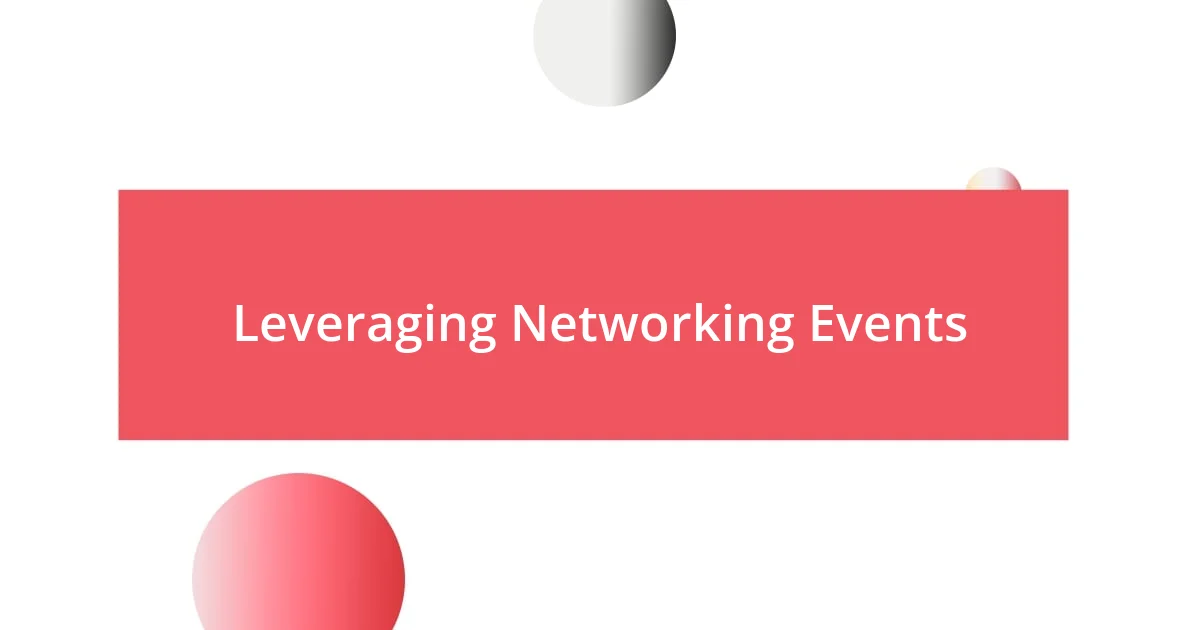
Leveraging Networking Events
Leveraging networking events has consistently provided me with opportunities I never anticipated. I recall attending a local workshop where I was initially overwhelmed by the talent in the room. However, after striking up a conversation with a fellow attendee over a shared interest, I discovered not only common ground but also potential collaboration on a project that benefited both of us. Isn’t it fascinating how stepping out of your comfort zone can uncover hidden gems?
In my experience, preparation is key when attending networking events. Before I go, I research attendees and speakers to identify individuals I’d like to connect with. I remember one event where I came armed with specific questions for a speaker I admired. When I finally approached them, our conversation flowed naturally and led to an invitation to join their next project meeting. How often do we miss out by not having a plan in place?
I’ve also found that the post-event social hour can be just as valuable as the formal sessions. At one such gathering, I struck up a casual conversation with someone who turned out to be a hiring manager at a company I admired. By simply being approachable and genuinely curious about their experiences, I not only learned about potential job openings but formed a lasting connection that eventually led to a mentorship. Isn’t it incredible how informal settings can sometimes yield the most important relationships?
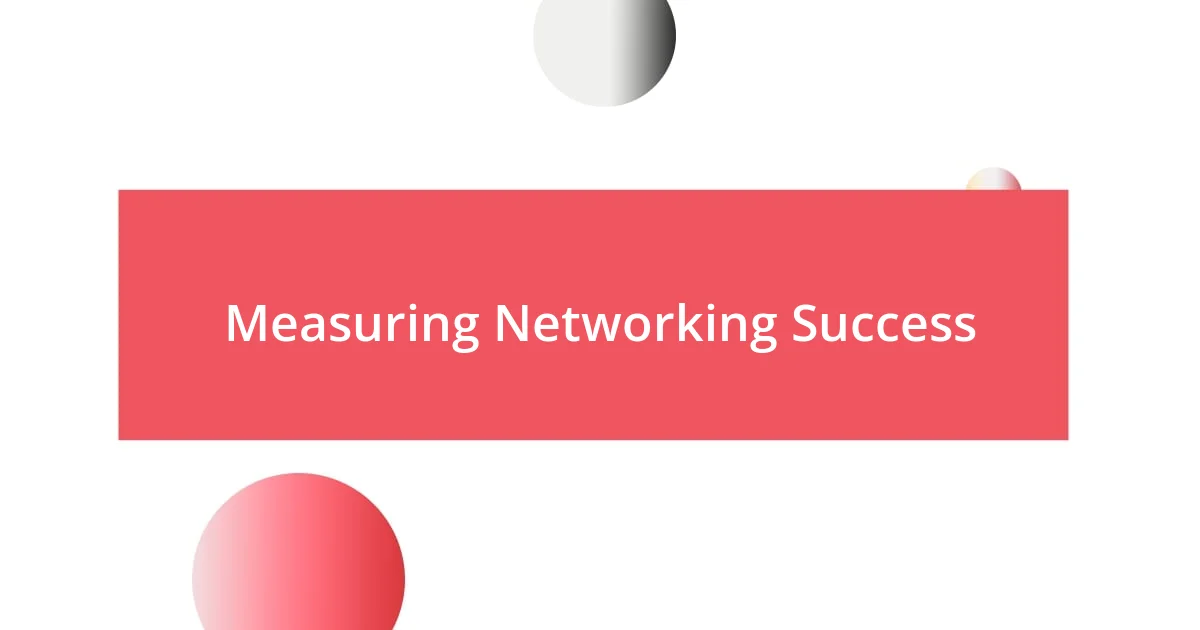
Measuring Networking Success
Measuring networking success can often feel ambiguous, but I’ve found that tracking specific outcomes really helps clarify my progress. After a recent conference, I made it a point to document not just the connections I made, but the subsequent actions resulting from those relationships. For instance, when I connected with a marketing strategist, I noted that we exchanged LinkedIn profiles and agreed to brainstorm on potential projects. Seeing those connections translate into actionable plans gives me a tangible sense of achievement.
I also believe that qualitative feedback plays a crucial role in evaluating networking success. When I follow up with new contacts, I often ask how they found our interaction and if there’s any way I can assist them. This dialogue has not only deepened relationships but has also yielded some insightful reflections on my approach. One time, a contact shared that my enthusiasm for collaboration inspired them to reach out to someone in their network, which in turn led to a successful venture. Isn’t it rewarding when your efforts resonate positively with others?
Another valuable metric I’ve started to utilize is the “follow-up frequency.” I track how often I can rekindle conversations and whether those interactions evolve over time. For example, I’ve noticed that when I consistently check in with contacts every few months, it often leads to an invitation for joint discussions or event participation. How has your own follow-up frequency impacted your networking outcomes? Through this approach, I can clearly see the ongoing value and sustainability of my professional relationships.



